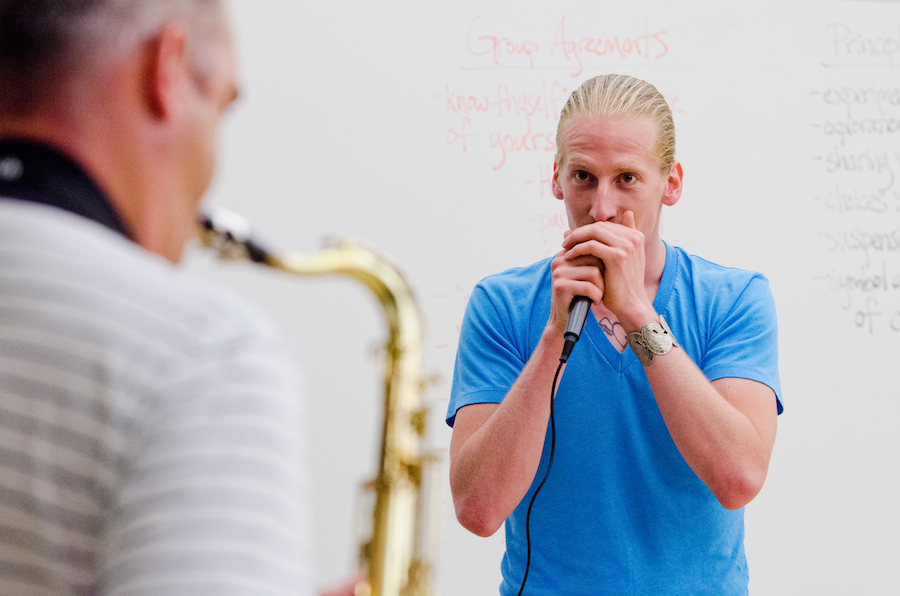Local poet and performer Griffin Payne can sum up three years of his life using just two words: “High, low, high, low,” he says, alternately raising his arm toward the ceiling and lowering it to the floor. “I had no clue what it was, and it took me to the limit. It crippled me.”
That was six years ago, when Payne experienced the first whisperings of bipolar disorder. He was 19 when he had his first major depressive episode, and the manic episode that immediately followed nearly destroyed most of his relationships.
“My mother,” he recalls, “just felt helpless. My sister wouldn’t talk to me; my dad was at a loss. I lost most of my friends, too, because they were like, ‘Where’s Griffin?’ But I didn’t know either.”
He continues, “It took me awhile to reach out for help, because I had no clue what was going on. I didn’t know I needed help.”
The following year, Payne found the help he needed, modifying his diet and getting therapy to help him learn how to manage those highs and lows. But most importantly, says Payne, he found spoken-word poetry.
“The simple fact of getting up on stages and sharing parts of my story with a roomful of people, and then to have people come up afterward and say, ‘I’ve been there’ or ‘You’re not alone with that,’ it was revolutionary for me,” he reveals. “Poetry saved my life, and that’s how I got into the work that I do now through performing and teaching spoken word in schools and community centers.”
Now, however, the 25-year-old is branching out: He recently launched The Ariadne Theater Project, a collaboration with the Western Carolina chapter of The National Alliance on Mental Illness. The eight-week series of free theater workshops meets Wednesdays in UNCA’s acting lab (see box, “Acting Out”). But this drop-in class isn’t for actors: The 15 to 20 participants who show up each week have all been affected in various ways by mental illness.
The objective, says Payne, is to create a space where people can gather and “explore stories in a deeper way that is full-bodied, that isn’t only analysis.”
Mental illness, he says, “is invisible, with so few visible effects that it can be so isolating. That isolation builds stigma — both self-stigma and social stigma. I saw that people really struggled to find places to go just to share stories and connect.”
In any given year, roughly 1 in 4 adults experiences a mental health disorder, according to 2008 data from the National Institute of Mental Health. Additional NIMH statistics show that 1 in 17 adults lives with a serious mental illness, such as schizophrenia, major depression or bipolar disorder, and 1 in 10 children lives with a serious mental or emotional disorder.
Accordingly, Payne’s class is also open to peers, loved ones and mental health workers. “That’s just about the whole community,” he observes. “That’s the subtle notion — that we’re not separate, not isolated. We are the wider community.”
Bill Kinschner understands that all too well: Thirteen years ago, his youngest daughter had her first acute encounter with mental illness. Today, he’s president of NAMI Western Carolina, a grassroots, Asheville-based nonprofit that advocates for people affected by mental illness. Kinschner and his wife attended Payne’s first workshop; during that session, Payne divided the class into small groups, asking people to imagine that they were made of clay and “mold” themselves to express how they felt when they first realized mental illness was going to be part of their lives.
“It was that moment when we encountered our daughter in a dark basement of her house in the fetal position and really just unable to communicate with us. That is a memory for me that will linger for the rest of my life,” Kinschner reflects. “The opportunity to share that in a stance of human ‘clay’ was something I’d never done before, and it drew out that memory and ability to show others what I was feeling — all this was done in silence, in body movements and positioning.”
Throughout the series, Payne will be gathering participants’ stories as the basis for a play he’ll direct. In the fall, those who choose to take their skills to the next level will perform it before a live audience, with the proceeds going to NAMI.
But ultimately, notes Payne, he hopes everyone who attends his workshops walks away with the ability to tell their own story, regardless of whether they perform in his production.
“There’s so much to discover through the intelligence and wisdom of our body, through the intelligence and wisdom of our emotions, all of that which is not always readily accessible just through words,” he points out. “If we don’t know and tell our own stories as a community, Hollywood will tell our stories for us; the media will tell our stories for us. Do we really want to be identified by someone else? I don’t. I want to have that authorship, and I would like to see the community speak with a louder, more effective voice.”
Want to go?
The Ariadne Theater Project meets Wednesdays from 6 to 8 p.m. in UNCA’s New Hall, Room 103. To take part in one or more of the remaining workshops, simply show up at 6 p.m. The final session will be held July 31. For more information, contact Administrative Director Claire Weber at namiwnc@yahoo.com, or visit namiwnc.org.
— Send your health-and-wellness news and tips to Caitlin Byrd at 251-1333, ext. 140 or mxhealth@mountainx.com or cbyrd@mountainx.com.




This article very simply reveals Griffin as a great human being with an illness, from which he is recovering. Thanks for this article that does not have any of the usual and dreadful stigma.